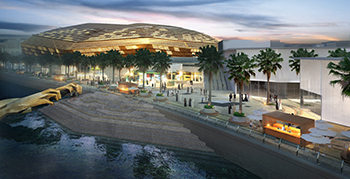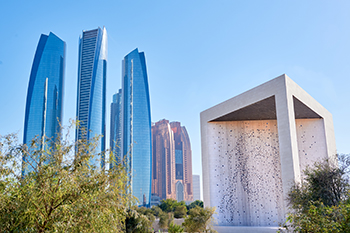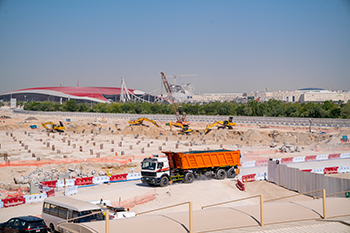Stimulating growth
Abu Dhabi is rising steadily on global growth indices, with an ambitious focus on citizen housing, real estate, sustainable power, tourism and the business environment.
01 September 2018
The emirate of Abu Dhabi, a quiet achiever, is pioneering a series of ground-breaking projects that will lead the UAE capital towards a sustainable and modern living and high economic growth.
Among these projects are the first nuclear power plant in the region that is progressing well at Barakah; the world’s first Hyperloop system; the world’s largest photovoltaic power plant; the plan to provide almost all citizens their own homes; and a massive city that will house 200,000 people.
The oil price that is on an upward trajectory and the increasing role of non-oil sectors in the economy, are expected to spur the Abu Dhabi construction, real estate and industrial sectors. This will be further accentuated by a $13.6-billion stimulus package announced by the government. As part of these plans, it will allow free zone-based companies to take part in government tenders and take steps to support new industries, encourage tourism and make it easier to do business.
Also, two years from now, the emirate hopes to be the number one globally with the largest percentage of citizens owning their homes.
 |
|
The Arena at Yas Bay project by Miral ... an upcoming iconic waterfront destination. |
Underpinning this goal are the UAE’s new housing plans that aim to ensure that 70 per cent of Emiratis have their own private residence by 2020. At 69 per cent, the UAE currently has the second-highest number of private residence ownership after Singapore, according to The National.
As part of government efforts to boost the living standards of citizens, Sheikh Mohammed bin Zayed Al Nahyan, the Crown Prince of Abu Dhabi and Deputy Supreme Commander of the UAE Armed Forces – who is also the chairman of the Executive Council – in June sanctioned the distribution of housing loans worth Dh7.5 billion ($2 billion) among Emiratis in Abu Dhabi, the newspaper reported.
Also part of this ambitious plan was the launch last November of the massive Riyadh City project – Abu Dhabi’s largest-ever housing city.
Another key development that could have an immense impact on the real estate sector is the strategic joint venture (JV) that Abu Dhabi-based Aldar Properties has entered into with Dubai-based Emaar Properties to develop projects worth Dh30 billion ($8.17 billion) locally and internationally.
The JV, which brings together the capabilities of two of the largest real estate developers in the UAE to deliver exceptional destinations, will initially focus on two projects – one in Dubai and the other in Abu Dhabi. The masterplanned destination in Abu Dhabi, named Saadiyat Grove, will be situated in the emirate’s cultural district on Saadiyat Island.
 |
|
The Barakah Nuclear Energy Plant ... the first nuclear power plant in the Arab world is around 90 per cent complete. |
This apart, Abu Dhabi has been trying to capitalise on the real estate development potential created by the world-class event Expo 2020 Dubai, which is set to take place in a couple of years, by spearheading projects nearer the Dubai-Abu Dhabi border.
According to BMI Research’s latest Infrastructure report for the UAE, the country boasts one of the most attractive business environments for infrastructure in the world, underpinned by robust opportunities across the sector, its safe operating environment and openness to private sector involvement.
An active real estate market and government-supported infrastructure spending in transport and utilities will continue to provide construction growth opportunities, it adds.
The BMI report also points out that the government aims to attract 7.9 million tourists annually by 2030 under its Abu Dhabi 2030 Plan, up from 4.875 million in 2017 which could spur growth in the commercial infrastructure space. Furthermore, the emirate hopes to expand its retail and office space to 4 million and 7.5 million sq m by 2030, respectively, up from 2.5 million and 1.5 million in 2013.
 |
|
The Founder’s Memorial pays homage to the late Sheikh Zayed bin Sultan Al Nahyan, founding father of the UAE. |
In line with these plans, the emirate is seeing a surge in the construction of shopping malls including projects such as Al Maryah Central and Reem Mall, as well as of theme parks such as the Warner Bros World Abu Dhabi, which opened in July.
Meanwhile, Abu Dhabi late last year witnessed the opening of The Louvre Abu Dhabi, the first museum to bear the Louvre name outside France. An iconic architectural masterpiece designed by French architect Jean Nouvel, Louvre Abu Dhabi took over a decade in the making. The project is the first of three world-class museums on Saadiyat Island, the others being the planned Zayed National Museum and the Guggenheim Abu Dhabi.
Housing
The Abu Dhabi government is expected to disburse housing loans worth Dh7.5 billion as the first phase of an annual 5,000 housing loan package for Emiratis in the capital in line with the economic stimulus package announced by Sheikh Mohammed bin Zayed in June.
A major housing initiative is the massive Al Riyadh City project that received the go-ahead last November, which will spread over 8,000 hectares in the South Shamkha, North Wathba area 30 km from Abu Dhabi Downtown. On completion, the city is likely to house over 200,000 citizens. The government has launched the Modon Real Estate Company to spearhead this project as well as for developing housing, infrastructure and community facilities in the emirate.
Power
Abu Dhabi’s pioneering project in the power sector is the Barakah Nuclear Energy Plant, the first nuclear power plant in the Arab world. The project has achieved a series of construction milestones over the past year, with the first unit having been completed in March this year (see Page 50).
Another project in the renewables sector is the Sweihan solar power project, which will be the world’s largest photovoltaic power plant. The 1,177-MW plant is being developed by JinkoSolar, Marubeni, and the Abu Dhabi Electricity and Water Authority (Adwea).
Other prominent projects in this sector include the Dh5.4-billion Mirfa independent water and power plant (IWPP) in the Dhafra region, which launched commercial operations last November. The plant, the 10th facility to be built under the public-private partnership model in Abu Dhabi, boasts a power generation capacity of 1,600 MW and 52 million gallons of desalinated water per day.
In the desalination sector, Abu Dhabi is moving ahead with plans for a reverse osmosis independent water project at Taweelah, which is targeted for completion by 2022. Some 25 developers have been shortlisted for the project, construction work on which is expected to commence in 2020. The $1.2-billion plant will have a capacity of 200 million gallons per day.
Transport
A pioneering initiative by Abu Dhabi in the transport sector is the plan to build the world’s first commercial Hyperloop system. In April, Hyperloop Transportation Technologies (HyperloopTT) signed an agreement with Aldar Properties to start construction of a Hyperloop system as well as HyperloopTT’s XO Square Innovation Center, and a Hyperloop Visitor Centre at Seih Al Sdeirah near the Alghadeer residential development.
The proposed construction site is located on the Abu Dhabi-Dubai border, close to the Expo 2020 site. However, any further development of the system is subject to careful study and extensive regulatory review and approval.
HyperloopTT said the construction of the line will be done in several phases starting within the 10-km allocation, with further development aimed at creating a commercial hyperloop network across the Emirates and beyond.
Meanwhile, the $11-billion Etihad Rail, which was earlier put on the backburner, now looks set to move forward with the second phase. The international group Egis has been awarded a project management consultancy contract for Stages 2 and 3. In addition, Jacobs Engineering Group has been selected to deliver critical technical and programme consulting services for the freight and passenger railway network.
In the ports sector, the Switzerland-based Mediterranean Shipping Company (MSC) is set to invest close to Dh4 billion on the development of a new container terminal at Khalifa Port. This will increase the port’s capacity from 2.5 million TEUs in 2017 to 5.3 million TEUs by 2020.
Real estate
According to leading real estate expert JLL’s latest Abu Dhabi Q2 real estate report, the stimulus package announced by Sheikh Mohammed bin Zayed will drive initiatives that directly affect the real estate sector by reducing costs for developers, promoting partnerships between public and private sectors, and also providing dual licences for companies located in free zones to bid for, and undertake government tenders outside the free zone. Also, the UAE’s decision to allow 10-year visas for expats and 100 per cent foreign ownership in companies outside of free zones will boost sentiment in the residential market, providing expats with more security over their rights to remain in the UAE, the report said.
Meanwhile, as per the agreement inked earlier this year, Aldar Properties and Emaar Properties will jointly develop Saadiyat Grove, which is targeted to open in 2021. The mixed-use development will feature 2,000 residential units, two world-class hotels, 400 serviced apartments and 130,000 sq m of lifestyle and retail space.
Aldar Properties, meanwhile, has recently reached an agreement with Tourism Development & Investment Company (TDIC) to acquire a portfolio of prime real estate assets on Saadiyat Island worth Dh3.7 billion, in one of the largest real estate acquisitions in the country’s history. It includes 14 operating assets within various sectors, in addition to prime strategic land plots and projects under development on that island.
Among other developments, Aldar has launched a Dh10-billion masterplan to expand Alghadeer, one of its already established destinations located near the border of Abu Dhabi and Dubai within its Seih Al Sdeirah landbank.
The new masterplan incorporates Aldar’s existing community which boasts over 2,000 homes. Alghadeer Phase Two will feature 14,408 residential units, which will be delivered over the next 15 years, as well as office, retail and hospitality space, education and community amenities.
Apart from Saadiyat, Aldar is spearheading developments in Yas, including its latest waterfront development Water’s Edge; the Dh3.2-billion West Yas community; Mayan, its luxury golf and waterfront apartment development facing Yas Links golf course; and Yas Acres.
Elsewhere in Abu Dhabi, its other projects include The Bridges and Meera residential development on Reem Island; Al Hadeel at Al Raha Beach developments; Nareel Island, a premium high-end plot development located on the coast of Al Bateen; and Al Merief, a residential community designed for UAE nationals in Khalifa City.
Meanwhile, UAE-based Miral, which oversees the development of Yas Island, is spearheading the Dh12-billion Yas Bay project which is expected to become one of the most iconic and vibrant waterfront destinations in the region. The development includes a fully-covered indoor arena, the first multi-purpose venue in Abu Dhabi.
Yas Bay is one of three distinct areas under development by Miral on the southern end of island, the others being the Media Zone featuring the new campus of twofour54 – Abu Dhabi’s media zone authority – and the Residences at Yas Bay.
Another major project launched this year is Al Fahid Island Development, a mixed-use waterfront development between Saadiyat and Yas islands. The masterplan will be delivered in five phases, with Phase One having a plot area of about 21 million sq m.
Among other developers, Imkan has started work on three of its big projects in Abu Dhabi – Makers District, an 18-hectare master-planned development on Reem Island (see Page 53); Nudra in the Cultural District on Saadiyat Island; and Sheikha Fatima Park.
Shopping Centres
Work is in full swing at the $1.2-billion Reem Mall, a leading retail, dining and leisure destination, with the substructure nearly finished and several sections of floor of the superstructure already completed.
The construction of the mall, which is being developed by Al Farwaniya Property Developments, began in late 2017.
Majid Al Futtaim is developing the new Dh1.4-billion lifestyle destination, City Centre Al Jazira between Airport Road and Al Muroor Road, which is expected to open in early 2021.
Meanwhile, UAE developer National Investment Corporation (NIC) has embarked on a Dh3-billion expansion plan for its retail venture Marina Mall Abu Dhabi. Work on the 300,000-sq-m expansion is expected to start this year.
In addition to the extension, NIC has revealed plans for a new promenade, Marina Walk, offering 546 m of prime waterfront views and 123,000 sq m of leisure and entertainment experiences, including Abu Dhabi’s first skate park.
- Stimulating growth
- Abu Dhabi projects at a glance
- Emirate set for nuclear crown
- Magnet for makers
- Reem mall makes headway
- Memorial for Sheikh Zayed
- A modern spiritual retreat
- Paschal helps shape landmarks across city
- NFT maintains its towering presence



